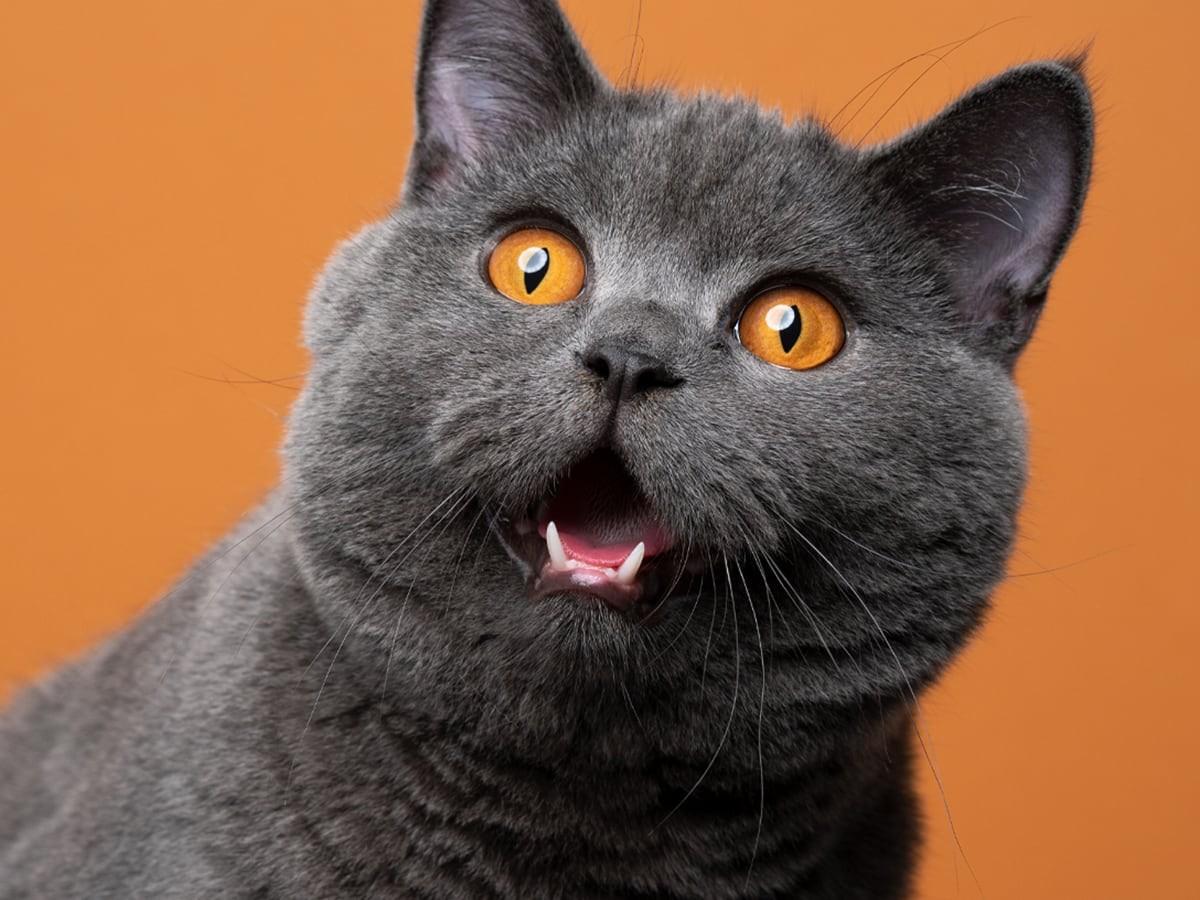Dogs pant — you probably see that every other day. However, seeing cats pant isn’t very common. Do cats pant for the same reasons that dogs do? Do you have a reason to worry about your cat’s health? Find out below as Spot Pet Insurance shares all the details.
Is it normal for cats to pant?
Cats regulate their body temperature by panting. Unlike humans, a cat’s body isn’t covered in sweat pores. This limits how well they can remove heat to cool themselves on a warm day.
Cats only have sweat pores on their paws. This is usually enough to keep them cool, so you won’t see cats constantly panting like dogs.
Why do cats pant?
Your cats may be panting for various reasons. Some of them are normal, while others signal health concerns.
Heat
Cats don’t always need to pant to keep cool. However, on a particularly hot day, the pores on your cat’s paws might not be enough to release the excess heat. If they get really hot, they’ll try to lose more heat through saliva evaporation when they pant. Dogs like the Great Pyrenees do the same thing.
You’re not likely to see your cats panting all the time. Their bodies regulate temperature well, and they also know how to avoid overheating by seeking shaded areas.
Physical Activity
Lots of physical activity can make your cat pant too. They may get exhausted after spending most of the day running around, fighting, and playing with friends. Kittens are more likely to tire out easily. Once they settle down from playing so much, simply monitor them while they recover.
Stress
Traveling, meeting a new animal family member, and hearing loud sounds can increase your cat’s anxiety. One of the ways that your cat may respond to stress is by panting. If you see your cat panting heavily, you might want to identify and remove possible stressors in their environment. Your cat should settle down once you eliminate the trigger.
If you’re driving to the vet, your cat may be panting and drooling. In this case, you may want to call to inform the vet you’re on your way and tell them about your cat’s symptoms. This way, your cat can get some calming treatment once you arrive.
In the meantime, you should do everything possible to keep your pet comfortable. Open the windows or turn on the air conditioning. This will cool your pet down and help relieve their anxiety.
Heart disease
Hypertrophic cardiomyopathy (HCM) in cats causes their heart muscles to become thicker. This makes them less efficient at pumping blood. Cats with this condition might not show signs of illness, but they may tire out easily. Labored breathing and panting are typical signs you might see.
Some cat breeds more prone to cardiomyopathy include the Maine coon, British shorthair, sphynx, ragdoll, and Persian. Aging also contributes to this condition.
Speak with your vet if your senior cats are panting a lot. They’ll examine your pet to determine their health status and the best possible treatment course.
Respiratory disorders
Cats can get respiratory diseases from bacteria or viral infections. Early signs include sneezing and coughing. Your cat’s symptoms may be mild or very severe, depending on the cause of the disease. A respiratory infection can cause mucus buildup and narrow the respiratory tract. In response, your cat pants while trying to breathe.
A vet appointment might be necessary if you suspect your pet has a respiratory infection. They’ll manage their symptoms to help them feel better. You can get humidifiers and steamers for your home. This helps loosen mucus in your cat’s airway so that they breathe freely.
Asthma
Cats can get an asthma attack when their immune system gives an exaggerated response to triggers — allergens or stress. Their respiratory tracts narrow as a result of this reaction. This makes breathing difficult, so they compensate by breathing with their mouths open and panting. Your cat’s allergy may be mild or severe, so they need medical care.
Signs your cat might have asthma include:
Panting
Fatigue
Blue lips
Coughing
Wheezing
Rapid breathing
Your vet may give your cat medications to open up their airway so that they breathe comfortably. You’ll also need to keep possible triggers such as cigarette smoke, pollen, grass, dust, and mold away from your pet.
Pain
When cats are injured or ill, they know how to hide pain well. They’re more likely to hide the pain from a chronic condition for an extended period. This makes it a little challenging to get your pet timely medical care. Signs your cat is in pain may be subtle, and one of them is panting.
Other symptoms of pain include:
Lethargy
Irritability
Loss of appetite
Reduced physical activity
Unpleasant sounds such as growling, groaning, and hissing
What should you do if your cat is panting?
Your cat may be panting while running around and playing with their friends. In that case, it might simply be due to exhaustion, and they’ll be fine after getting some rest.
On a warm day, your cat might be panting because their body temperature increases. Give your pet a bowl of cool water to drink. This could help replace lost fluids and balance their body temperature. If they cool down enough, they likely won’t be panting anymore. A cold snack may also help your cat regulate their body temperature.
Removing possible stressors in your cat’s environment is another way to calm your panting cat by relieving their anxiety.
When should you take your cat to the vet?
Usually, your cat will be panting for normal reasons such as heat regulation, anxiety, or exhaustion. You can generally manage these at home. However, this isn’t always the case. Your cats may have other symptoms that could indicate underlying health conditions.
Signs to look out for include:
Hiding
Lethargy
Wheezing
Coughing
Loss of appetite
Shallow breathing
Blue or pale gums
Loud and raspy breaths
Some conditions that cause panting in cats require urgent medical care, so you mustn’t delay the visit to your vet. Chest X-rays may be necessary for diagnosis. Some cases may require oxygen therapy, IV fluids, medication, or fluid drainage. It all depends on why they’re panting in the first place.
Final thoughts
A panting cat isn’t as unusual as you might think. They don’t do it as often as canines, but it’s not impossible. Cats may pant when they’re hot, tired, or stressed. These are normal causes of panting, and your cat usually stops after getting some rest or drinking cool water. You only need to monitor them to make sure they’re not ill.
Some health conditions could potentially make your feline friend pant a lot. They usually show other signs such as loss of appetite, difficulty breathing, personality changes, lethargy, and coughing. Abnormal reasons why cats pant may include heart disease, asthma, respiratory diseases, and pain.
Once you spot any unusual signs along with the panting, set up that vet appointment. Cats won’t always reveal they’re in pain. Therefore, they may have been dealing with their symptoms for a long time.
Your cats will receive a physical exam and X-rays at the vet’s office. This shows what’s going on with their body so that they get the care they need.
Like any parent, you’re always worried about your cat’s health. Worry no more because Spot Pet Insurance supports you with reliable information.

Mostly a tech person, always a pet person. I am dedicated to improving the lives of pets and their humans with technology. Off-duty, I enjoy writing about the misbehaving of computer programs and my two Aussiedoodles, Calvin and Hobbes.
Hypertrophic Cardiomyopathy | Cornell University College of Veterinary Medicine
Cat Asthma: What It Is, Symptoms To Look For, And How To Treat It | Trudell Animal Health
How Do I Know if My Cat is in Pain | VCA Animal Hospital












